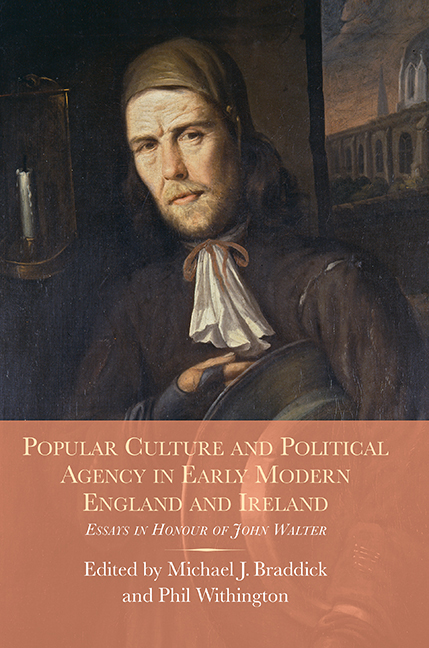 Popular Culture and Political Agency in Early Modern England and Ireland
Popular Culture and Political Agency in Early Modern England and Ireland Book contents
- Frontmatter
- Contents
- List of Illustrations
- List of Contributors
- Acknowledgements
- List of Abbreviations
- Introduction
- 1 John Walter and the social history of early modern England
- 2 Contrasting susceptibility to famine in early fourteenth- and late sixteenth-century England: the significance of late medieval rural social structural and village governmental changes
- 3 The politics of English political economy in the 1620s
- 4 Provision, household management and the moral authority of wives and mothers in early modern England
- 5 Popular senses of past time: dating events in the North Country, 1615–1631
- 6 Spectral lordship, popular memory and the boggart of Towneley Hall
- 7 Self-image and public image in the career of a Jacobean magistrate: Sir John Newdigate in the Court of Star Chamber
- 8 Gender, agency and religious change in early Stuart England
- 9 ‘A Standard which can never fail us’: the Golden Rule and the construction of a public transcript in early modern England
- 10 Religion, anti-popery and corruption
- 11 An ‘Aristotelian moment’: democracy in early modern England
- 12 John Lilburne and political agency in revolutionary England
- 13 An Irish Protestation? Oaths and the Confederation of Kilkenny
- 14 ‘Whereat his wife tooke great greef & died’: dying of sorrow and killing in anger in seventeenth-century Ireland
- Bibliography for John Walter
- Index
- Tabula Gratulatoria
- Miscellaneous Endmatter
Introduction
Published online by Cambridge University Press: 09 May 2017
- Frontmatter
- Contents
- List of Illustrations
- List of Contributors
- Acknowledgements
- List of Abbreviations
- Introduction
- 1 John Walter and the social history of early modern England
- 2 Contrasting susceptibility to famine in early fourteenth- and late sixteenth-century England: the significance of late medieval rural social structural and village governmental changes
- 3 The politics of English political economy in the 1620s
- 4 Provision, household management and the moral authority of wives and mothers in early modern England
- 5 Popular senses of past time: dating events in the North Country, 1615–1631
- 6 Spectral lordship, popular memory and the boggart of Towneley Hall
- 7 Self-image and public image in the career of a Jacobean magistrate: Sir John Newdigate in the Court of Star Chamber
- 8 Gender, agency and religious change in early Stuart England
- 9 ‘A Standard which can never fail us’: the Golden Rule and the construction of a public transcript in early modern England
- 10 Religion, anti-popery and corruption
- 11 An ‘Aristotelian moment’: democracy in early modern England
- 12 John Lilburne and political agency in revolutionary England
- 13 An Irish Protestation? Oaths and the Confederation of Kilkenny
- 14 ‘Whereat his wife tooke great greef & died’: dying of sorrow and killing in anger in seventeenth-century Ireland
- Bibliography for John Walter
- Index
- Tabula Gratulatoria
- Miscellaneous Endmatter
Summary
One of the perennial concerns of social, cultural and political historiography is the interrogation of the categories of ‘elite’ and ‘popular’ politics and their relationship to each other. This has gone hand-in-glove with the exploration of why and how different sorts of people engaged with politics and behaved politically. Historians have been particularly concerned with understanding how ordinary people framed political questions (for example, the languages they deployed and the ways in which they arrived at their understanding of the issues) and the actions available to them to act on that understanding (for example, the repertoires of individual and collective action, the legal and other means of asserting political agency). While such issues are timeless, they hold especial importance for a society like early modern England experiencing rapid political and social change. In English historiography in the 1970s and 1980s, however, the concurrent development of political revisionism and of the ‘new social history’ made the connections between these questions at once less clear but also more open to creative reinterpretation. On the one hand, historians of early modern English politics became very suspicious of accounts of political change which ‘reduced’ politics to a consequence of economic and social change, searching instead for explanations which placed greater weight on contingency and the logic of institutional procedures, and on the effects of religious and political ideas. On the other hand, social historians turned their attention away from the conflicts which dominated standard political narratives to the politics of everyday life: social relations in the household and the village. As a result, connections that had previously been made between the political and social history of early modern England were severed.
More recently, new connections have been found between these realms of experience. The deep roots of English governance and its reliance on broad voluntary participation meant that the actual exercise of power was relatively open to influence. Rumour, news and print, as well as official channels of communication such as assize sermons and royal proclamations, made the discourses of politics, and of particular political and religious debates, widely available.
- Type
- Chapter
- Information
- Popular Culture and Political Agency in Early Modern England and IrelandEssays in Honour of John Walter, pp. 1 - 14Publisher: Boydell & BrewerPrint publication year: 2017
